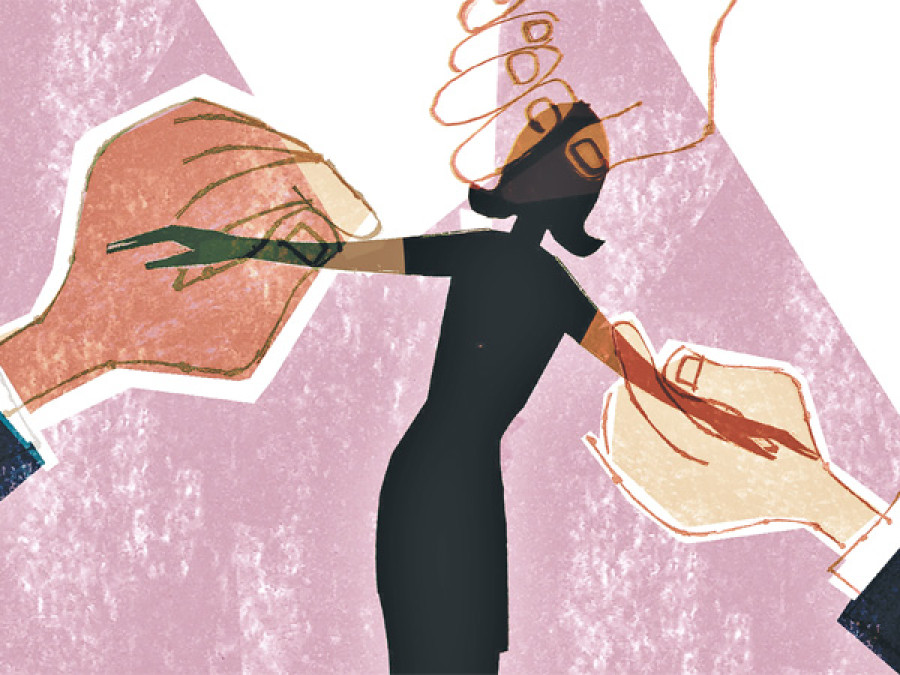Opinion
Miscarriage of justice
Nepali women stand to lose the ability to control their fertility if the draft constitution is not rectified
Melissa Upreti
Although it was 14 years ago, it feels like yesterday when I stood before a packed audience in New York to denounce the US’ enforcement of the Global Gag
Rule which barred any overseas organisation that received US foreign
assistance from not only providing safe abortion services, but engaging in any abortion-related activities, including advocacy for law reform.
Back then, an estimated half of all maternal deaths in Nepal were due to unsafe abortions and one in every five women doing time in prison was there on charges of abortion or wrongly imprisoned for infanticide. These issues resulted from Nepal’s own ban on abortion, but were exacerbated by the Global Gag Rule which deterred advocates in Nepal from speaking out.
After meeting with survivors of unsafe abortions in prisons across Nepal and hearing their stories of injustice, I felt a sense of despair which led me to join a group of lawyers in suing the US government for violating the basic rights of the most vulnerable and marginalised women in my country.
After groundbreaking progress to ensure women’s reproductive rights through the legalisation of abortion in 2002 and the recognition of reproductive rights as fundamental rights in 2007, today my own government wants to take away our hard won rights, which has left me with the same sense of despair. Nepal’s draft constitution circulated for public comment is undeniably regressive, watering down a critical provision in the 2007 Interim Constitution guaranteeing women’s reproductive rights as fundamental rights, to only recognising a woman’s right to reproductive health care in connection with safe motherhood and childbirth. Also deeply troubling is the new language recognising sex-selective abortion as punishable, despite the practice already being criminalised in the Muluki Ain.
Instituting discrimination
Reproductive rights are human rights, which include the right to access a broad range of sexual and reproductive health services and the ability to make decisions about one’s reproductive and sexual health and life. Without legal guarantees of access to these services, unlike men and boys, women and girls face the risks of early pregnancy, debilitating pregnancy-related injuries and even death. They are robbed of the ability to decide if and when to start a family and become vulnerable to sexual coercion, exploitation, and violence within and outside marriage. Reproductive health concerns include infertility, which often carries stigma for Nepali women and may be used against them as a ground for bigamy.
For eight years, women in Nepal have enjoyed what most women elsewhere can only dream of—recognition of their reproductive rights as fundamental rights. The Supreme Court of Nepal has issued groundbreaking decisions recognising the government’s failure to ensure access to safe abortion services and prevent pregnancy injuries like uterine prolapse as violating women’s rights to life, dignity, health and freedom from gender-discrimination. Forced pregnancy has been recognised as a form of enslavement and violence against women. Internationally, government failure to ensure access to quality maternal health care and safe abortion services legally have been held as discriminatory and a source of cruel, inhuman and degrading treatment.
The recognition of reproductive rights as fundamental rights in Nepal’s Interim Constitution demonstrates the state’s prioritisation of women’s reproductive rights, and now our government wants to turn back the clock and restrict women’s access to services that they need to survive and live with dignity.
Despite law reform, maternal deaths in Nepal remain high, of which unsafe abortion is the third leading cause. Ten percent of women suffer from uterine prolapse, up to 400 cases of obstetric fistula are reported each year and child marriage is still far too common leading to a higher incidence of early pregnancy and maternal deaths among adolescent girls.
Personal autonomy
Our nation should be addressing the root causes of gender discrimination that lead to sex-selective abortion, including the perception that girls are inferior to boys, instead of limiting their reproductive choices.
Contraception, abortion and safe motherhood are services that only women need and any attempt from the government of Nepal to renege on its obligation to ensure women’s access to these services and the autonomy to make choices in relation to them, is a violation of women’s fundamental human rights. The government’s failure to retain language in Article 20 (2) of the Interim Constitution in the new constitution will both formalise discrimination against women at the highest level and violate international law.
Nepali women deserve better. Our ability to control our fertility affects many aspects of our lives, including our education, family life, career and civic participation. It is the basis for ensuring our personal autonomy and self-determination—something we stand to lose if the current draft is not
rectified.
Our government made great strides with the Interim Constitution and the new constitution must meet the same standard by guaranteeing full recognition of women’s reproductive rights as fundamental human rights.
Upreti is a Nepali lawyer based in the US and the regional director for Asia at the Center for Reproductive Rights




 10.12°C Kathmandu
10.12°C Kathmandu










